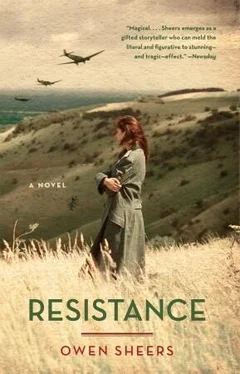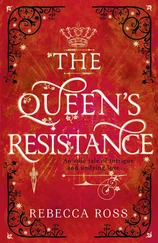She hadn’t wanted to go. Her father was keen she should, though. He and her mother were getting older now. “Can’t have you stuck wi’ us old’uns every night, bach,” he’d told her. He’d got his friend’s daughter Branwen to call for her, to make sure they went.
There was a band. A live band with one of them playing a fiddle and another on a trumpet. The men drank beer, cider, and wheat wine. Some of the women did too. It was the end of September, the hard part of the year over with until winter. The air in the hall was thick and musty with released energy, with anticipation.
Branwen got talking to one of the men they’d not seen before, a thin dark-haired builder with a thick moustache. It was he who introduced Sarah to Tom, to stop her hanging around Branwen like a mute chaperone. Tom had been drinking cider. She could smell it off him, sweet and rich. She’d spent all day bottling pears, all day with her fingers in their soft yellow bodies. When they’d danced, after an hour or so of talking, their smells mingled, apple and pear. “Together we make an orchard,” she’d laughed into his ear. Tom hadn’t understood her, but he’d still smiled at her, and after that first dance he’d carried on smiling all night. It was more than he’d ever smiled since, but by the time he’d called on Sarah a couple of times over the following weeks, that didn’t matter anymore. By then she’d come to like his serious silence. It was solid, like him; a strong, secure quiet, still as a sudden pool in a shallow running river.
It was a winter courtship. For the next few months after the dance, Tom would ride over the Hatterall once a week on a Sunday to meet Sarah and walk with her. They always walked, even when the weather got cold. Through the lanes, down to the ruined abbey, and sometimes up onto the bare hilltops, where birds started away from under their feet and a herd of wild ponies witnessed their first kiss. Tom knew every plant and bird they saw, and sometimes his conversation consisted of no more than a list of names accompanied by short nods of his head in the direction of whatever he was naming. Sarah told him he was like Adam walking through the garden of Eden, naming the animals for the first time. He’d looked down at her and she’d seen that again he hadn’t understood her, but she’d also seen again that it didn’t matter. Her arm through his, sharing the hillside in evening light, resting her head against his shoulder as they walked. These were what mattered to her then.
One Sunday after their walk, Tom came in for tea. Her mother made too much of everything, bread and butter, bara brith , piled slabs of cheese. Tom and her father talked about farming and that was when he told her parents about Upper Blaen, his late uncle’s farm over in the Olchon he’d be taking on come spring. After tea her father took Tom out to show him his prize ram. That must have been when Tom asked her father for Sarah’s hand, because the next Sunday, as they were standing by the river watching the snow melt in its eddies and foam, as she warmed her fingers under his jacket, he’d asked her to marry him.
After the wedding they’d come straight to Upper Blaen, and then, that night, they’d come here to this bed. Sarah had no older sister to speak with and her mother had long since retreated too far behind her sayings and phrases to ever talk straight about anything. Still, Sarah thought she knew what to expect. She’d lived on a farm all her life, and even Branwen, whom she’d seen some more of since the dance, had at times talked of their future wedding nights.
Now, years after that first night together, after five years of marriage and two months of Tom’s missing, she tried to remember completely. Everything. The sound of him washing in the basin as she lay waiting; the scent of the skin on his shoulders; his hands touching her clumsily where they’d never touched her before; his hair brushing coarse against her cheek. The way he’d moved above her, the weight of him. The way he’d groaned as if in pain and the way he’d suddenly shivered the length of his body, the muscles of his back quivering like a horse’s flank under the touch of summer flies. The way he’d shrunk away from her afterwards, like sand through an hourglass.
Sarah hadn’t shivered like Tom that night and she didn’t for many nights afterwards, until early one morning, when Tom was out on the hill, she’d discovered she could move herself in a way that Tom never had. Lying there on her own that morning, with the grey wash of the dawn seeping through the curtains, she’d made herself lighter. It had felt as if she was turning a cord within her, tighter and tighter, until eventually it broke inside her, releasing her thighs to clasp about her fingers as she fell from the height of her rising. As she’d fallen Sarah’s blood had switched within her, flicking the wrong way down her arteries and veins before subsiding back, diminished with its return but still charged with the resonance of that sudden momentum. A slow burn dissipating across her pelvis and hips like the concentric ripples of a sinking stone, spreading and fading over the surface of a lake.
Sarah gasps. Lying alone once again, in her dark bedroom, she lets out a short, rasping gasp. The dogs in the yard below bark, their sounds muffled through the snow at the window. She’d wanted to conjure Tom. She’d wanted to salvage him from the depths of his missing with all her senses. And she had. He’d been here again, with her in their bed, looking down at her. But then as she’d lain beneath him his face had begun to change until it was no longer his she saw above her, but that of the captain’s. The German captain’s face, looking down at her, the snow melting in his hair as he removed his glasses to reveal those two red impressions, imprinted like shallow brandings on either side of the bridge of his nose.
The coming of the snow made a choice for the whole valley that Albrecht had already made for himself and his men. They would not leave. They could not go anywhere. The Olchon was choked with snow, frozen closed. Even the distant view, had they been able to climb the hills, had gone, obscured behind low cloud and mist. It was as if his silent prayer had been answered and for once the weight of his own decision taken from his shoulders. It had even been Alex who’d suggested going out to help the farm women. So all he’d had to do was respond, respond to circumstance just as any good Wehrmacht officer should. That was why he’d gone to see the old woman afterwards. To ensure some kind of a working balance, an equilibrium in their shared and now forced isolation, for however long it might last.
The visits to the other farms by his men had gone well and he’d wanted to capitalise on this moment. Boredom; that, as ever, was the greatest danger. The patrol must not be allowed to get bored. So far they had all, he knew, relished this caesura in their war. None of them were in a hurry to return to the front. But soon they would get restless, ask questions of him. Especially the younger ones, Gernot, Otto, and Steiner. So they must have more involvement, more work. This is why Albrecht made the choices he did.
He’d allocated them to each farm carefully, making quick calculations of their characters. Sebald he’d sent to Maggie because he was closest to her age. He was also a medic and so had acquired the trustful, patient face of someone who’d listened to countless chronicles of pain. If the old woman could be won over by someone other than Albrecht himself, that might be enough.
The silent Otto he’d sent up to the simple woman on the top of the hill. The young soldier still carried a fragility about him and Albrecht felt that the woman, who he’d been told had lost her only son early in the war, would recognise that fragility. He’d seen it before, a kinship of damage, a shared recognition of fractured souls. Although he suspected the woman couldn’t read, he still gave Otto a note explaining his presence. Even if she could read, Albrecht felt the boy’s silence would communicate more to her than words ever would.
Читать дальше












